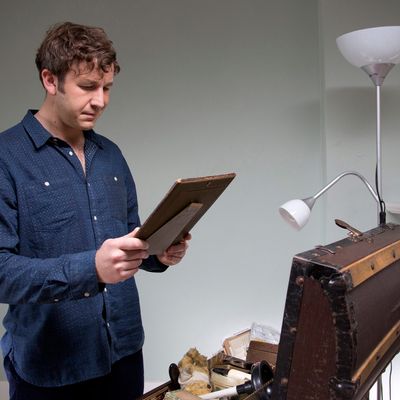
Christopher Guest’s new HBO series Family Tree (which premieres Sunday at 10:30 p.m.) has been described as a comedy about a man discovering his family history. That’s accurate, but it doesn’t capture what makes this series so unexpectedly good and special. While it scores easy laughs from the sight of its sad sack hero, Tom Chadwick (Chris O’Dowd), marveling at the walrus mustache in a photo of his maybe-great, great grandfather, or mistaking a Victorian dildo for a flute, the biological/historical questions are a means to an end. Family Tree is mostly about actors improvising in character, on a comedic spectrum so droll that it often takes a moment to register that these are the jokes, folks. “I’ve always had a bit of a military air about me,” Tom tells his best friend Pete (Tom Bennett), fantasizing about the soup-strainer portrait. “I mean my bravery. My innate courage. I was the first member of our group to wear skinny jeans.”
Genealogy is useful here, though, if you look at Family Tree as another entry on a comedic, er, family tree. Actor-filmmaker Guest (Waiting for Guffman, A Mighty Wind), who co-created the show with Jim Piddock, is the father of the comedic mock-documentary, and since he became a mainstream-ish success about fifteen years ago, a flood of Guest-like sitcoms with improvised riffing, handheld camerawork, and confessional monologues have filled the airwaves: the British and American The Office, Parks and Recreation, and Modern Family were the most successful, but there were others. Guest, meanwhile, has become a borderline non-presence as a theatrical filmmaker; his last feature, For Your Consideration, came out in 2006, a year after the American Office debuted. One can imagine younger viewers thinking Family Tree represents one too many trips to a particular comic well, without realizing that Guest himself helped dig that same well back in 1984, when he co-wrote This Is Spinal Tap for Rob Reiner and collaborated with Billy Crystal on a Saturday Night Live mock-doc about Negro League ballplayers.
Luckily, even though Family Tree has all the usual Guest tells, it doesn’t feel like the same old, same old. It has a more measured (okay, slow) pace, and underplays the characters’ eccentricities. Tom’s dad (Guest vet Michael McKean) is obsessed by certain vintage English TV series (all nonexistent programs invented by Guest and Piddock), but the show doesn’t find his obsession weird or mockable. And when he drags Tom down one of his trivia rabbit-holes, the younger man seems more amused than irritated. Tom’s sister Bea (Nina Conti) is a ventriloquist who communicates with her family through a monkey puppet. The first time you see her with it, it’s ha-ha funny. The second time, you notice that Bea is actually a decent ventriloquist. Then you gradually forget that the puppet is a puppet, and think of it as the friend who happens to be attached to Bea’s arm.
The sum total feels like a creative evolution for Guest. As hilarious as they often were, Guffman, Best in Show, and his other mock-docs were all rather broad. They fetishized or at least italicized their characters’ quirks — and the quirks themselves were surreal or outrageously odd. Family Tree treats oddness nonchalantly, inspiring laughs of recognition rather than mockery. Corky St. Clair’s My Dinner With Andre playset in Guffman was funny because it was hard to imagine a real person owning such a thing; in contrast, when a character in Family Tree shows off his “monuments in bottles” — which he makes because the ship-in-a-bottle has been done to death — it seems like the sort of misguided passion project that a friend or relative might undertake. Family Tree is less belly-laugh funny than wry and occasionally poignant. It’s a monument in a bottle.


